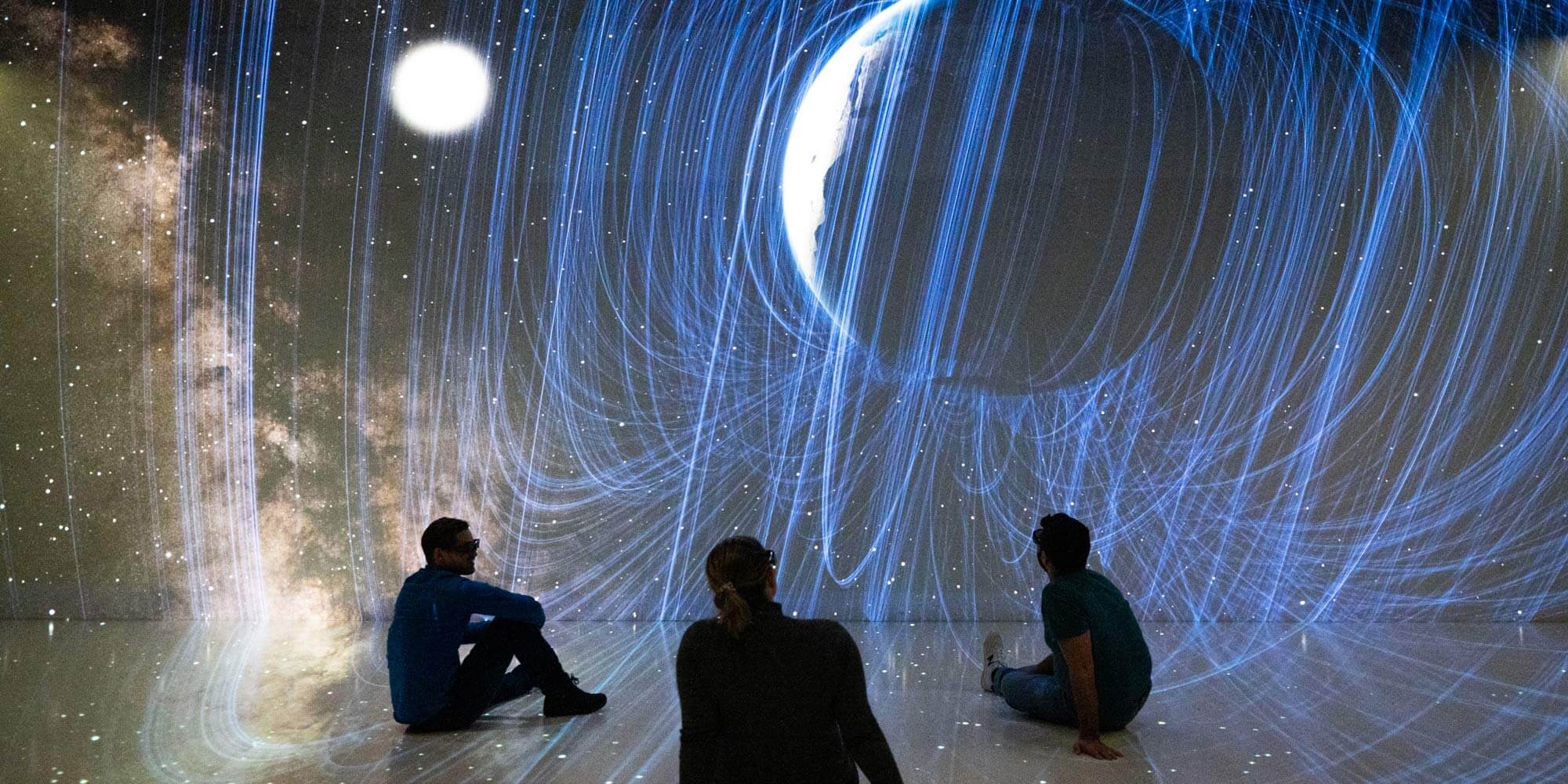With an immersive program, the Ars Electronica Center ventures into the future in fast motion to look back from there: How will humanity have prevented the collapse?
Read more: Is technology the answer?When millions of people took to the streets in 1970 to demonstrate for environmental protection and sustainability, Earth Day was established in the USA. In the meantime, this international day of remembrance, which is celebrated every year on April 22 to dedicate ourselves to our planet, has developed into a global movement. 175 nations are actively participating to raise humanity’s awareness of the importance of sustainable living and protecting our environment, and to inspire action to do so. Organizations around the world use this day as an opportunity for events that bring the issue to the center of our attention. With its Earth Day themed weekend, the Ars Electronica Center is also participating in this global movement.
With an immersive program on SA 4/22 and SO 4/23, it will venture into the future in time-lapse and look back from there: How will humanity have avoided the collapse caused by climate crisis, resource scarcity, species extinction and exponential growth? With the short film Our Earth VR, the interdisciplinary project team fuses 3D animation and sound into a virtual reality experience, creating a science-based utopia Deep Space 8K – a human success story. In our conversation, project manager Claudia Puck took a self-reflective look at the subject and addressed the question of what role technology actually plays in life on this planet.
As a media producer in the field of science communication, you probably deal with this question again and again: What role does technology actually play in life on our planet – is it now part of the solution or rather part of the problem?
Claudia Puck: Depending on how it is used, technology is often both – part of the solution and part of the problem. Technologies such as renewable energy, electromobility, and carbon capture and storage can help address the climate crisis and promote sustainable development. On the other hand, technology can also have a negative impact on the planet if it leads to pollution, waste of resources and overuse of energy. So the question is how we use technology and what actions we take to eradicate its negative impacts and maximize its potential.
Technologies always involve both benefits and costs. We must therefore be aware that technologies entail both opportunities and risks, and we must strive to use them responsibly and sustainably.
Renewable energies such as photovoltaics or wind energy are good examples of how technology can be part of the solution. They can reduce Carbon dioxide emissions and counteract the climate crisis. On the other hand, manufacturing and disposing of electronic products can increase the environmental footprint and lead to a waste of resources. So the balance must always be weighed: Is the technology necessary and appropriate to significantly improve our quality of life, as a community – not just that of a small number of individuals? Is it designed in a way that does not harm other creatures in our environment? And does the technology justify the consumption of the materials and energy used? Possibly, yes, it is conceivable to do without various things. For example, I don’t see an overwhelming benefit in the standby mode of electronic devices. In the Western world, we use between 5 and 10 percent of our electricity to enable devices to be activated from a distance of one or two meters. That is absurd.
Especially processes that develop slowly often escape our perception. However, a collective awareness of the changes that are currently endangering our life on this planet is a particularly important part of the solution. What is the role of technology-based science communication in this context? Would it even be conceivable to initiate global rethinking processes without modern communication technologies?
Claudia Puck: Clear and comprehensible science communication makes a significant contribution to increasing understanding and thus acceptance of measures that help to counteract the waste of resources and climate change. In principle, of course, it would be conceivable for rethinking processes to get underway even without modern communication technologies. In fact, they are already taking place to some extent. Each of us is already experiencing the climate crisis in our own living environment: freak weather, drought and water shortages, shifts in the vegetation phases of plants, and so on. Inevitably, we have to think about it.
Science can tell us what larger interrelationships are emerging and what problems we will still have to face. Whether it needs modern communication technologies, such as the Internet, cell phones, social media, e-mail and so on, to do so is questionable. They undoubtedly increase the range and speed of dissemination of information. But traditional media such as radio and print can also play an important role in creating collective awareness. Personal relationships and oral communication may be most effective. The dangers of the climate crisis are comprehensive, and it will probably take all communication channels to create awareness.
What is Our Earth VR about?
Claudia Puck: Our film outlines a utopia. We want to show that measures to protect the environment, to protect biodiversity and to combat the climate crisis do not automatically mean renunciation and restriction. With our short film we cannot go into all possible measures, but we will use the film as a starting point for discussions. We want to arouse emotions, – especially in the direction of positive motivation: we want the audience to realize that we as humanity can do something about the environmental destruction, that most of the solutions are already on the table, we just need to apply these solutions, and that if we apply them, this can lead to a better life for all of us.
Films can be a powerful platform to bring attention to complex issues and reach a wide audience. We want to inspire audiences to think further about the issue and take action. We want to encourage people to take action to protect the environment and policy makers to take action to address the crisis.
The premiere of Our Earth VR is scheduled for April 22, 2023 at 18:00 in Deep Space 8K. Following the screening, including the making-of, we invite you to the premiere party in the foyer of the Ars Electronica Center. Here you will have the opportunity to discuss the topic with the production team of Our Earth VR, but also many other interesting people. Register at 0732.7272.0 or center@ars.electronica.art. Around the Earth Day we offer on this theme weekend also much more varied program in Deep Space 8K. Join us!

Claudia Puck has been working in the field of communication for over 20 years and is the owner of Mindfloat Claudia Puck KG, which specializes in science communication services. She has been involved in the realization of various film projects. In addition, she is particularly committed to environmental and climate protection. In her work as a science mediator and filmmaker, she always tries to integrate these topics into her projects and create awareness for sustainability and environmental protection.
